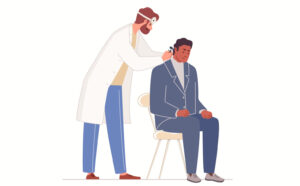How Do I Get the Most Out of a Hearing Evaluation?

A: You’re already off to an ideal start — it’s important to see a trained hearing professional. They’ll help you make safe, effective decisions about your hearing health. But let’s get to some specifics — keep the following in mind.
It’s More Than a Hearing Screening
Hearing care isn’t one-size-fits all. A simple hearing screening (“Can you hear this tone?”) is important, but it doesn’t reveal enough about your situation.
Hearing is complex, so your appointment is a comprehensive evaluation. And the more engaged you are in the process, the better your outcomes will be.
Trust That Each Test Has a Purpose
During your evaluation, your provider develops a comprehensive picture of your hearing health.
Possible Causes
It’s crucial to determine the cause of your hearing loss before any treatment plan can be developed. The cause could be simple (earwax buildup or debris), common (loud noise or aging), or complicated (disease or head trauma).
Physical Health
Your ear canal, eardrum, middle ear, and inner ear all need to function correctly. If one of them doesn’t work as they should, a hearing aid is a band-aid at best. It might even make things worse.
Speech Understanding
This is a huge piece of the hearing puzzle. You’ll test how well you understand speech in a quiet setting, but also how well you hear in increasing amounts of background noise.
Your Hearing Loss Is Unique
No two hearing losses are alike, and no two people have the same circumstances. Your hearing aids are customized and programmed to meet your specific needs. Hearing professionals are especially skilled in ensuring they’re right for you now and in the future.
You Might Have Other Conditions
Hearing loss is often accompanied by tinnitus (ringing in the ears) or balance issues. A hearing evaluation from a professional might help shed light on these other health care concerns. If your provider doesn’t specialize in these issues, they can certainly get you pointed in the right direction.
A Final Thought
As mentioned already, it’s great that you’re seeing a trained hearing professional. Recently, the U.S. FDA gave the go-ahead to manufacturers interested in selling over-the-counter (OTC) hearing aids. But as you can see, a lot happens at a hearing evaluation, and for a reason. Simply buying OTC hearing devices might end up masking a genuine health concern. Plus, an error in programming could make your hearing worse, not better.
If you’ve been wondering about your hearing lately, contact us today to schedule an appointment!
